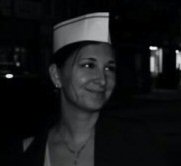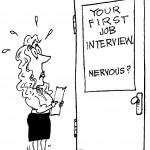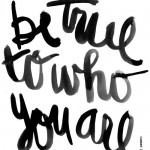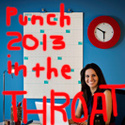Write the Stories You Want to Read: Caitlen Rubino-Bradway on Exercising Your Writing Muscle
Welcome, Caitlen! For the benefit of those who don’t already know you, will you please give us a 5-second description of yourself and your profession?
I’m a writer in the morning, and an office assistant/junior agent/nanny in the afternoon. My mother and I published a novel in 2009, Lady Vernon and Her Daughter, and we have a short story in the up-coming collection Jane Austen Made Me Do It. My first solo novel, a middle-grade fantasy, is due out April 2012. My editor has not yet told me what the title’s going to be.
Why writing? What attracted you to the craft?
A mix of competition and superiority. My mom wrote several mystery novels when I was in high school, and a friend and I decided we could do that. Couldn’t be that hard, right? And then I just kept on doing it.
How long have you been writing?
I’ve been writing since high school, so eleven-ish years.
Would you agree that writing for a living is a difficult road?
Do you mean writing for a living, as in financially supporting yourself? Because, yes, that is difficult. First, the writing itself is difficult, and draining, and exhilarating. And then it’s difficult because it just takes so much time. Time to actually write, and then find an agent, and get published. Time to build and audience and get to the point where you can support yourself. Most of all, it takes time to develop your writing style.
I see. So what were your experiences that led you to get published, and get you where you are today?
I have to say, the best and most helpful experiences are the internships and jobs I’ve held in the publishing industry. I’ve known that I’ve wanted to write for a while, and ever since I started writing, I’ve known I wanted to get published. The work experience really taught me that publishing is a business, and how that business works. If I want to write as a job, then I have to treat it that way and know that others – my agent, editor, etc – will expect me to treat it that way.
Knowing what you know now, is there anything that you’d do differently if you were to do it again? Put another way, do you have any advice for aspiring writers wanting to do what you do?
I don’t know that I’d do anything differently, because I expected writing to be hard, and I like where I am. Also, writing is such a personal thing that everybody has to find their own way. As for advice for aspiring writers, I basically have three things. First, write the stories that you want to read, stories that you find interesting. Second, if you want to be taken seriously, you have to take your writing seriously. That doesn’t mean you can’t have fun, though. And, third, remember that publishing is a business.
Great advice! I especially like your suggestion to write stories that you want to read. Personally, I’ve started several stories that I am initially excited about, but over time I lose interest in my own story. I laugh to myself, thinking “Why would anyone else read my stories if even I’m not interested in them?”
I am so with you on that, and we all have those moments of ‘oh, god, what am I writing, no one is going to want to read this!’ Especially since writing is something you have to do all on your own — you have to be your own cheerleader and drill sergeant. But if you’re interested in the story you’re telling — if you love the characters and the dialogue and can’t wait to write what happens next — that’s going to come across on the page.
Speaking of unfinished stories, many say the hardest thing about being a writer is overcoming writer’s block, where you must force yourself to write even when you don’t want to. Can you tell me about your writing process? What strategies do you use for writing often?
My writing process starts with a pretty detailed outline. Some people like outlines, some don’t — I find it works for me because it helps me sort the story out in my head, even if I don’t stick to it. And I usually don’t.
I also don’t write in chronological order. Again, this works for some people, and not so much for others. My mom cannot move onto Scene C before she’s settled Scenes A and B. I like to write whatever I’m most interested in at that moment. It could be the first chapter, or the ending, or the climax, or some random scene where everyone’s getting pizza. I find this helps me avoid writer’s block for the most part, and those scenes add up pretty quickly.
As for writing often, I…get up and write often. Unfortunately, it is that simple. I’ve got myself on a routine, which helps, and I’ve found a cafe where I like to write and I can focus. But writing is like a muscle — the more you exercise it, the easier it is to do heavy lifting.
What is your favorite book/author?
Terry Pratchett. He is so completely awesome, I can’t handle it. The way he puts words together is just amazing. I have to say, the Tiffany Aching series is close to my heart, but my absolute favorite book, hands down, is Going Postal.
Would you say your favorites influence your own writing? Do you have other sources of inspiration?
I always have other sources of inspiration. I don’t consider myself a creative person, so much as a long-winded editor. I get a lot of my ideas by reading or watching something, and getting frustrated because they told the story wrong, so now I must do it correctly.
That’s hilarious! I’m sure that all of us draw inspiration from other stories, but hearing you describe it as someone else “telling the story wrong” is too funny.
In addition to the favorites you already mentioned, do you have any “must reads” for anyone looking to strengthen their writing muscle? What essential text do you consider to be your writer’s manifesto?
I don’t really read a lot of writing-how-to books. I really enjoyed Stephen King’s On Writing, but the parts about his writing career stuck with me more than his advice. I will read a lot of books in the particular genre I’m writing in — middle grade fantasies when I was working on my To Be Published, and oh so many Austen sequels when mom and I were writing Lady Vernon. Reading the genre, especially if the book has some sort of connection to what I’m working on, keeps my mind in the game and I get a lot of ideas.
So, would you say your official title is author? Can you describe a typical day in the life of one?
Sure, author sounds good. A typical day for me starts bright and early, when I head over to my favorite cafe to clock a couple hours of writing. It has strong coffee and no wifi, two things which are very important for me to focus. Afterwards it’s time to head over to the small literary agency I work at, before my boss’s kids get out of school and I head out with one of them for a playdate or after-school sport. If it’s a quiet playdate and I’m under a time crunch, I might get another hour or so of writing in, but by the evening I’m mostly done creatively. I have to make sure I don’t write too late — when I get tired, I get anxious and start thinking up stupid, sweeping plot changes.
What do you consider your proudest achievement in life?
Getting published. It’s what I’ve always wanted.
I can only imagine what it must have felt like. Can you describe the first time you held a copy of your book?
It was awesome, but in a quiet way. Throughout the publishing process you see so many different copies of your book, you get a little used to the ‘oh, here’s another version.’ But seeing Lady Vernon in the bookstore was surreal.
What is your favorite word? Least favorite?
I really like the word ‘indigo.’ It sounds like the color. I tend not to gravitate towards individual words, but more combinations of. Good phrases or lines are what catch my attention. As for least favorite, that would be ‘rejection.’
So what’s next for Caitlen Rubino-Bradway?
My mom and I have a short story in an upcoming anthology (Jane Austen Made Me Do It, Oct 11). I’m also working on a young adult contemporary sci-fi, and hopefully there’ll be a sequel to the children’s fantasy.
Excellent. I’m looking forward to reading your works. Do you have any final words of advice for aspiring writers today? And where can we find out more about you or read your stories?
I’d say, writing is hard, more so because it’s so solitary. And you’re going to have days when everything stinks, and the words aren’t coming, and none of your characters are behaving, and every sentence is like pulling teeth. But everybody has those days. Tomorrow can only get better.
You can get Lady Vernon and Her Daughter at Amazon, and Jane Austen Made Me Do It will be available online and in bookstores on October 11th. My children’s fantasy will be out in April 2012, and, trust me, I will be telling everyone where they can get a copy.
 Caitlen lives and works in New York City — mostly in coffee shops but rarely in Starbucks cause it’s so hard to get a table.
Caitlen lives and works in New York City — mostly in coffee shops but rarely in Starbucks cause it’s so hard to get a table.
Do you know anyone like Caitlen that might be interested in sharing their story on LifeReboot? Please Contact Me!
Have any writing or publishing questions for Caitlen? Please ask in the comments!
Related Posts
| If you've found this website helpful, please click the PayPal button. You will be helping me pursue my dream career as a writer. Thanks for your support! |














3 Responses to “Write the Stories You Want to Read: Caitlen Rubino-Bradway on Exercising Your Writing Muscle”
Caitlen, I’m shocked that you don’t know the name of the book you’re writing! You honestly have to wait until your editor tells you what it will be called? What if you disagree? And don’t you take it personally when someone edits your work? I agree with you about writing being personal, so I’d expect you to have more control over the title.
Hi Debbie!
Yup, final say on a book’s title and cover are up to the publishers. It’s written into the contract: they get the final say. Editors are really good about consulting with authors, though — they’ll think up five titles and ask you which one you like best, or send in a mock-up of a cover and ask for your feedback. For me, it’s actually kind of a relief, because titles are not my strong point.
Your editor/publishing house is also approaching it from a different pov, which is helpful. For instance, the title used to be THE EXTRAORDINARILY ORDINARY TALE OF ABIGAIL HALE, which basically came from an ‘oh crap this needs a title’ urge. But my editor was concerned that title didn’t reflect what was going on in the book (it didn’t) and that they’d just published a book with a very similar title and didn’t want readers to get confused. They also try to think of it in terms of audience — I’m going for girls 8-12, who tend to pick up books with titles that include words like ‘magic’ and ‘princess’ and ‘enchantment.’ Now if only I had a magical enchanted princess in the book, this whole title thing would be settled. My editor and I have been tossing around a couple, but we haven’t found one we’re in love yet.
Also, this is not to say that you’ll sell your story and the editor will immediately scratch your title and replace it with something they thought up. In my experience, it’s about 50/50, depending on audience, and other titles out there, etc.
As for taking edits personally…yes, I have to admit there’s some part of me that gets stung when I get edits. Part of me always hopes they’ll be all, “You are so fabulous we have gone BLIND!” and throw rose petals in my path. But, realistically, it’s not going to be that way. I’m only one person, and not matter how good a writer I am, there’s going to be things that need to be fixed. There’s a certain point, for me at least, where I’m too close to the story. I can’t see the forest for the trees. That’s where my editor comes in. It helps that I know she’s is awesome at what she does, and she’s professional, and all of her edits are about making the story better. All writers, I think, need someone who can take a step back and objectively say what the problems are. It’s important to remember that the editing process is about getting the best story possible.
Caitlen
Caitlen,
Congratulations on a publication date!
We met at nanowrimo. Was this the book you were editing then?
-JK
p.s. You recommended Austen’s P&P, a book I wouldn’t have picked up on my own, so I owe you one.